B2C AI SEO Case Study: $7.7M Revenue Increase Within 11 Months

This Australian compensation claims leader started with a single-page website that ranked only for their brand name. Eleven months later, they've generated $7.7M in revenue from organic search, claimed the #1 market position, and secured 54 Google AI Overview citations while competitors remained invisible in AI search results. This case study demonstrates what happens when you combine technical SEO fundamentals with AI search optimisation before your market catches on.
A Quick Guide to B2C Professional Services SEO Case Studies
A professional services SEO case study demonstrates how service-based businesses utilise search engine optimisation to generate qualified leads and drive revenue growth through enhanced visibility and optimised conversion pathways. Unlike product-focused case studies, professional services studies track longer consideration cycles, emphasise expertise demonstration, and attribute revenue to specific organic channels through detailed conversion tracking.
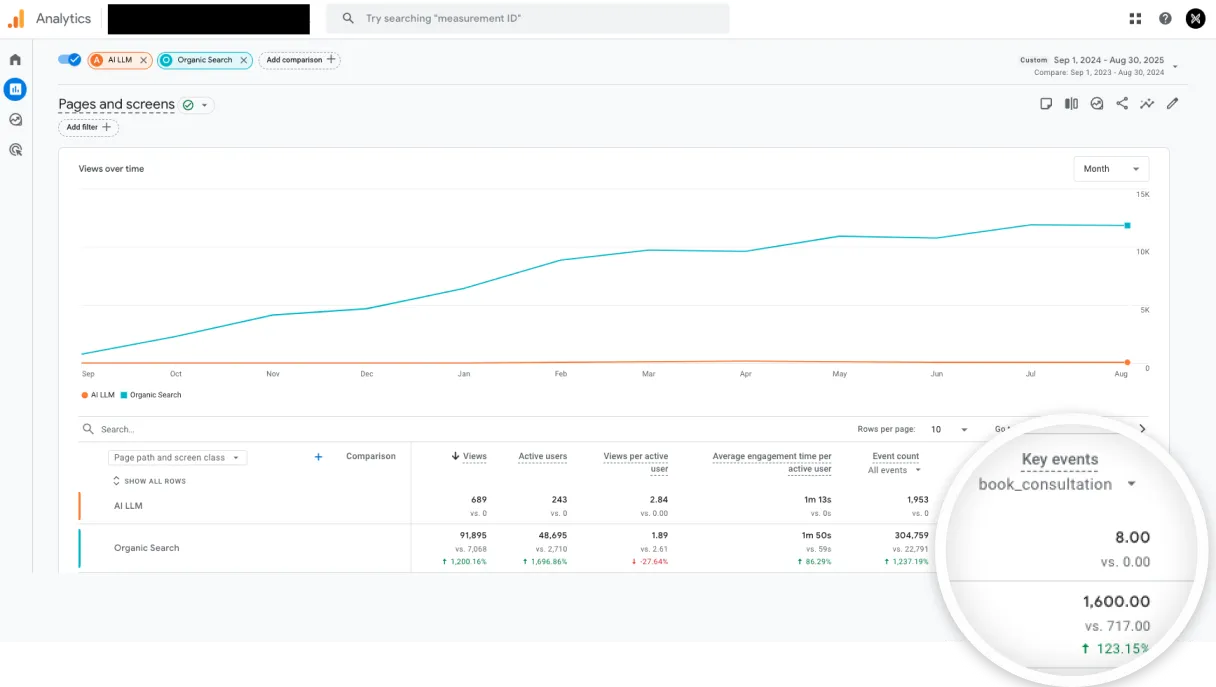
Performance Highlights
Revenue & Business Impact:
The revenue figures below represent incremental revenue attributed to organic search, based on conversion tracking and client average revenue per customer data. All calculations were reviewed and approved monthly by the client to ensure accuracy and reliability.
- A$7,714,350 Total Revenue: Generated from organic search over 11 months (October 2024 - August 2025)
- A$911,400 Peak Month: July 2025 delivered the highest monthly revenue
- 248 New Clients: Acquired through organic search channel at 15% conversion rate
- 13,926% Average ROI: Achieved across the campaign period
Search Visibility:
- 1,102 Keyword Rankings: Grew from 15 positions in April 2024 to 1,102 by August 2025
- 425 Page One Rankings: Achieved 96 positions 1-3 and 329 positions 4-10
- 59,500 Organic Clicks: Delivered via Google Search Console over 16 months
- 17,140% Traffic Value Growth: From A$5 to A$862 monthly equivalent PPC value
Market Leadership:
- #1 Market Position: Grew share of voice from 2.4% to 3.7%, overtaking established #1 competitor
- Competitor Displacement: The top competitor dropped from 3.9% to 2.8% market share
- 54 Google AI Overview Citations: First-mover advantage in AI search results
- 65 Total AI Citations: Across Google AI Overviews, ChatGPT, Gemini, and Copilot
Technical Excellence:
- 98-100/100 Health Score: Maintained across 184 indexed pages
- 60.5% Mobile Traffic: Optimised mobile experience driving the majority of conversions
- 3.5% Average CTR: Above industry benchmarks for the B2C claims services vertical
The Challenge
Understanding where this client started puts the results in proper context - this wasn't about optimising an existing SEO programme, but building organic search capability from near zero.

Starting From Scratch
Before engaging Rankmax in October 2024, this compensation claims leader operated a single-page website that ranked for a single page one keyword: their business name. Despite holding a strong market position through referrals and paid advertising, they had zero organic search presence in a sector where veterans and serving defence members actively search for claim support.
Complete Search Invisibility
The client's digital footprint consisted of a single ranking keyword, while competitors dominated thousands of high-intent searches. Terms like "DVA compensation claims", "permanent impairment claims", and "veterans mental health claims" were entirely owned by competitors, forcing complete reliance on Google Ads that consumed the majority of their marketing budget.
No AI Search Presence
While ChatGPT and other AI tools began answering thousands of DVA-related questions daily, the client appeared in exactly zero AI responses. Early-mover competitors gained citations through existing content, building authority in AI search results before the market understood the significance of AI.
Board-Level Scepticism
Directors questioned whether SEO could deliver meaningful revenue for a professional services firm or if they should maintain focus exclusively on paid channels. Previous marketing success had come entirely from paid advertising, creating uncertainty about the viability of organic search in the compensation claims sector.
Market Share Pressure
The client held 2.4% organic search visibility, but faced established competitors with a stronger organic presence. Without SEO investment, the gap would widen as competitors continued building authority through content and technical optimisation.
The Solution
We deployed Rankmax's AI-First SEO methodology, recognising that search behaviour is fundamentally changing. With 58.5% of searches now resulting in zero clicks, our approach targeted both traditional rankings and emerging AI platforms simultaneously.
Strategic Keyword Targeting
We identified high-intent, lower-competition keywords specific to compensation claims processes and condition-specific queries. Terms like "PTSD compensation claims" and "permanent impairment claims" had stronger commercial intent due to search specificity, despite lower volume than generic "compensation claims" searches.
The keyword difficulty averaged just 3.64 across our target list, indicating that we could achieve page one rankings through content quality rather than expensive link-building campaigns.

AI Content Architecture
We restructured content using semantic HTML and passage-level optimisation, making pages easily parseable by AI systems. Each service page included structured FAQ sections designed for AI citation, with TL;DR summaries optimised for featured snippets and AI Overview appearances.
Content followed natural language patterns that both users and AI systems prefer, avoiding keyword stuffing while maintaining topical authority through comprehensive coverage of user questions and queries.
E-E-A-T Optimisation
We implemented Experience, Expertise, Authoritativeness, and Trust signals throughout the site:
- Author profiles and schema for blog posts demonstrating industry expertise
- "About Us" and "Meet the Team" pages showcasing credentials and experience
- Organisation schema markup providing structured business information
- Copyright notices and business address in the footer for trust signals
These elements helped Google and AI systems recognise that the content originated from legitimate DVA claims experts, rather than generic content farms.
The Implementation
The campaign rolled out across three distinct phases, each building on the foundation laid by the previous phase while maintaining the technical excellence that keeps organic growth sustainable.

Month 1-2: Technical Foundation
We began with a comprehensive technical audit and remediation phase. The site initially had multiple structural issues that prevented proper crawling and indexing. Key improvements included:
- Fixed duplicate meta descriptions on the homepage
- Implemented single, optimised H1 tags on all pages
- Reduced unused CSS by limiting Google font weights and families
- Compressed and converted images to WebP format
- Added explicit width and height attributes to prevent layout shifts
- Implemented descriptive alt text across all images
By October 2024, we achieved a 98/100 Ahrefs Technical SEO Health Score across the site - a position maintained throughout the campaign.
Month 2-5: Content Transformation
Our team created a content hub focused on informational keywords aligned with the compensation claims journey:
- Awareness content: "What is a DVA card?", "DVA gold card entitlements"
- Interest content: "DVA claims process", "How to make a DVA claim"
- Consideration content: "DVA payout calculator", "Average DVA payout for PTSD"
- Commercial content: Service pages optimised for different types of DVA claims
Each piece used our recommended blog layout optimised for featured snippets, People Also Ask sections, and AI citation. Content included a table of contents, TL;DR summaries, comprehensive FAQs, and author credentials to establish expertise.
Month 6-11: AI Optimisation & Scaling
We created comprehensive guides answering complex compensation questions while optimising for AI search visibility:
- Structured content for easy AI parsing and citation
- Natural language patterns matching how users ask questions
- Comprehensive coverage addressing all aspects of topics
- Clear, concise answers suitable for featured snippets
Google AI Overviews began citing the client's content immediately, generating the first AI-attributed client conversions by March 2025. We scaled successful content patterns across additional topics, building topical authority in DVA claims.
The Results
The numbers below represent the compound effect of technical excellence, strategic content, and AI optimisation working together across 11 months.
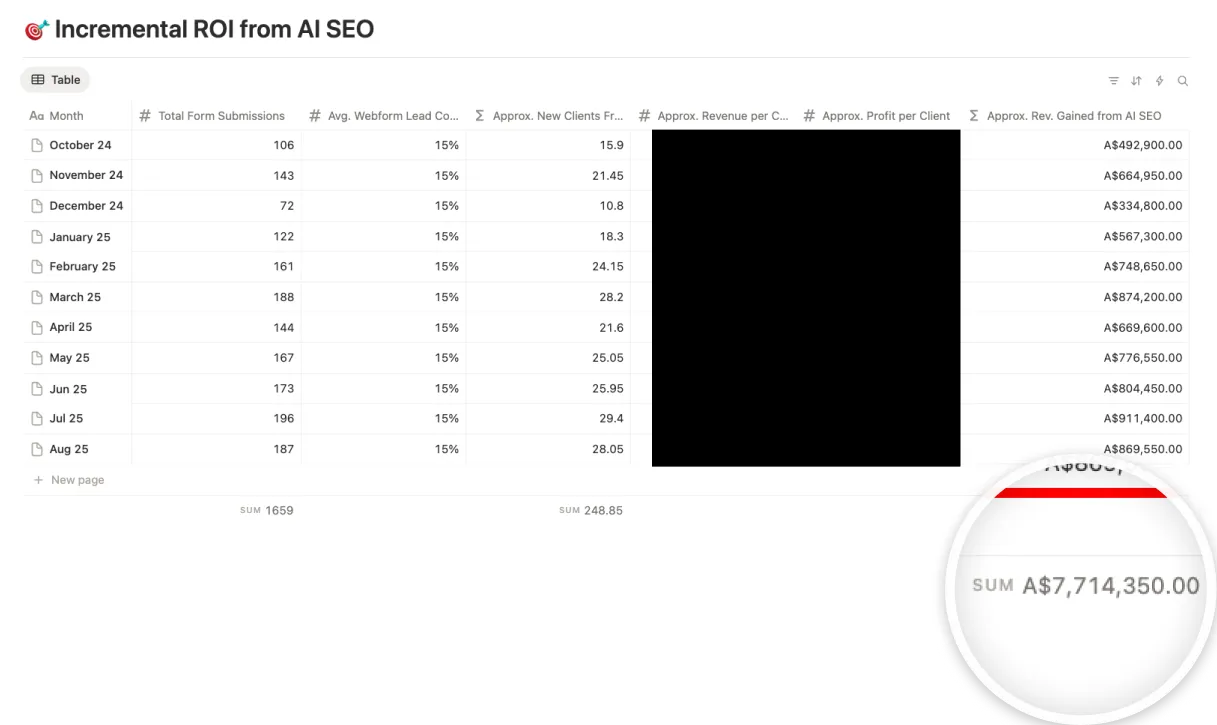
Revenue Transformation
Monthly organic revenue grew from A$492,900 in October 2024 to a peak of A$911,400 in July 2025. Total revenue over 11 months reached A$7,714,350, representing a 13,926% average return on investment.
This ROI calculation follows standard marketing methodology: (Revenue Generated - Marketing Investment) / Marketing Investment × 100. We track incremental traffic and conversion rates based on actual client data, with all revenue calculations reviewed and approved monthly by the client to ensure accuracy.

Search Visibility Explosion
Rankings tell part of the story. The site grew from 15 keyword positions in April 2024 to 1,102 positions by August 2025 - a 7,247% increase. More importantly, we achieved 96 top-three positions and 329 positions 4-10, dominating page one for high-intent compensation claims keywords.
Traffic value increased from $5 in April 2024 to $862 in August 2025, equivalent to a monthly Google Ads spend of $862 if acquired through paid channels. This 17,140% increase demonstrates the compounding value of organic search assets.

However, the real breakthrough came from AI search visibility, with 54 Google AI Overview citations, as well as consistent appearances across ChatGPT, Google Gemini, and Microsoft Copilot. These 65 total citations represent customers that competitors cannot reach through traditional search alone.

Traffic Growth & Engagement
Google Search Console data shows 59,500 clicks delivered over 16 months, with 1.71 million impressions and a 3.5% click-through rate. Mobile devices drove 60.5% of all traffic, validating our mobile-first optimisation approach.
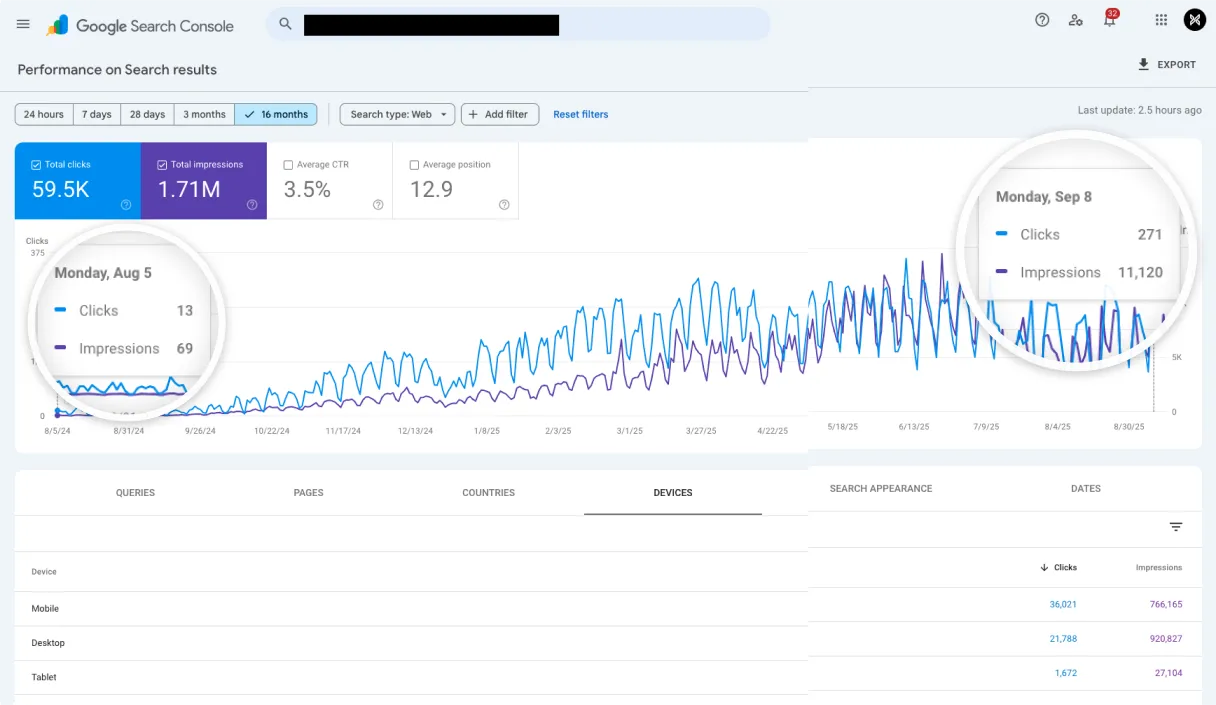
Competitive Moat
The client secured the #1 organic search position in their market, increasing their share of voice from 2.4% to 3.7%. Meanwhile, the previous market leader dropped from 3.9% to 2.8% share of voice.
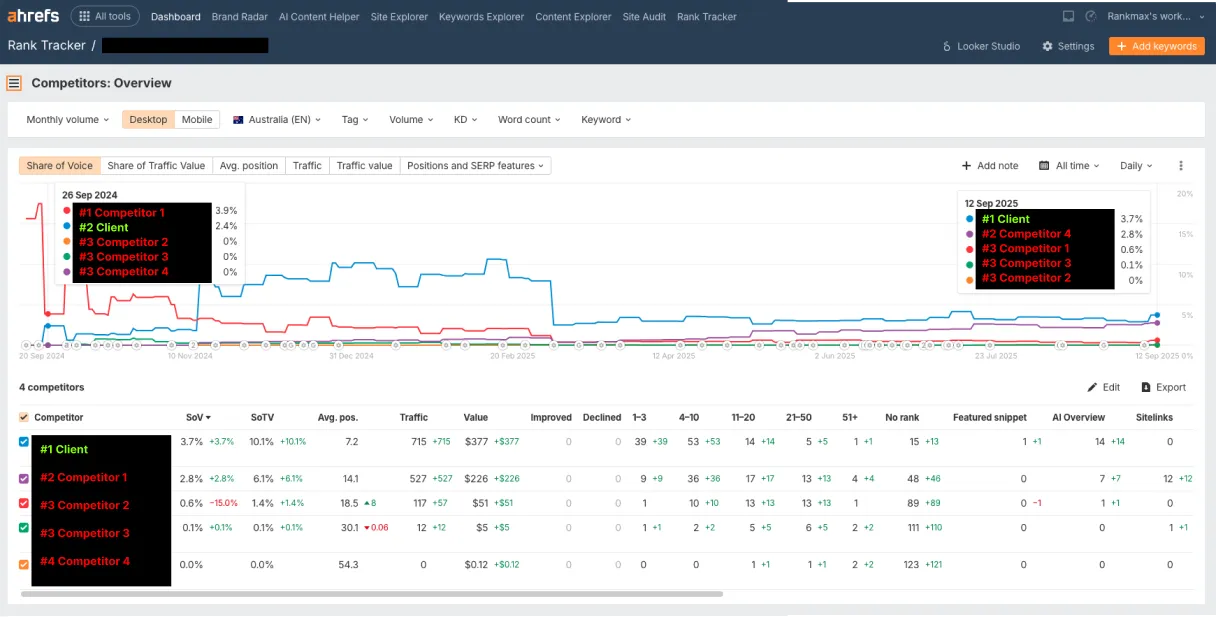
With a first-mover advantage in AI search and dominant traditional rankings, competitors would need 18-24 months to catch up, assuming they started today with equivalent resources and expertise.
New Client Acquisition
The campaign generated 248 new clients over an 11-month period. Each client represents someone actively searching for compensation claims support who found the client through organic search rather than expensive paid advertising.
Every one of those clients is a customer competitors lost because they didn't invest in organic search visibility.
Content Conversion Performance
The campaign maintained a 2.39% conversion rate from organic search traffic - significantly higher than industry benchmarks for blog-driven lead generation. AI search traffic converted at 2.34%, demonstrating that AI-referred visitors have comparable intent quality to traditional organic search.
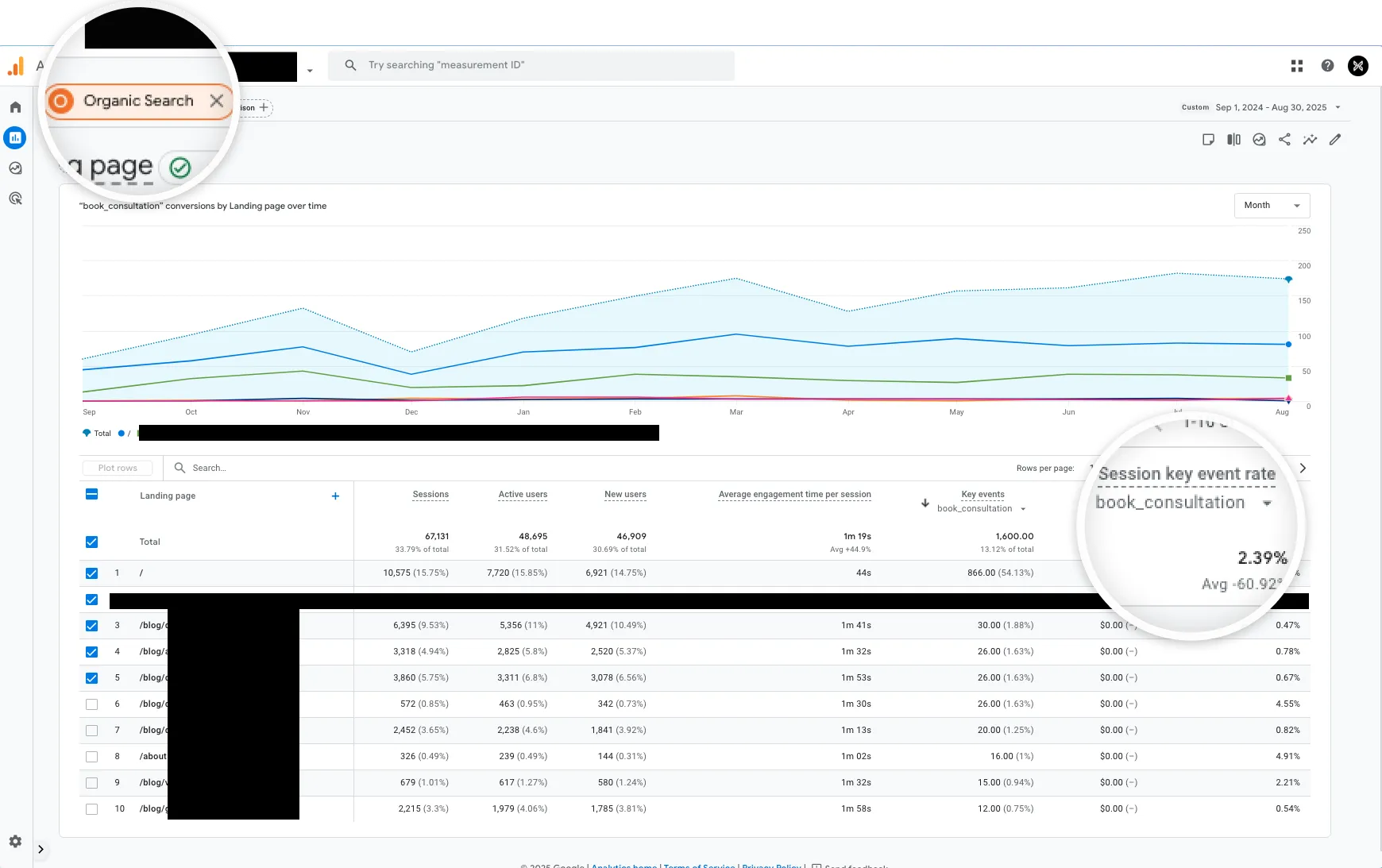
What makes these numbers particularly significant: 90%+ of conversions originated from blog content rather than service pages. Most professional services firms assume blog posts don't convert leads - they see blogs purely as top-of-funnel awareness tools.
This data proves the opposite. When you create comprehensive, intent-focused content that genuinely answers user questions, blog posts convert at rates comparable to or better than service pages. The key is matching content to search intent rather than just targeting random keywords.

Each blog post served triple duty:
- Traditional SEO: Ranked for target keywords and drove organic traffic
- AI search optimisation: Structured for AI citation and featured snippet capture
- Conversion pathway: Guided readers from problem awareness to consultation booking
This approach eliminates the false choice between "awareness content" and "conversion content." Every piece does both jobs simultaneously when properly executed.
Frequently Asked Questions
How long does it take to see professional services SEO results like these?
Initial improvements typically appear within 8-12 weeks, with significant revenue impact by month 4-6. This case achieved measurable traffic growth by month 2 and positive ROI by month 1, though results vary based on competition and starting position. Professional services firms can expect a 6-9 month timeframe for full SEO maturity, with compounding returns extending years beyond the initial investment.
Can these strategies work for other professional services firms?
Absolutely. Professional services firms - legal, financial, consulting, and medical - can achieve even better results than product-based businesses due to their expertise advantage. Your knowledge and credentials naturally create E-E-A-T signals that AI systems highly value. The key is demonstrating expertise through comprehensive informational content in combination with detailed service pages, and optimising for both traditional search and emerging AI platforms simultaneously.
What's the minimum budget for professional services SEO success?
For professional services firms serious about organic growth, start with a monthly minimum of A$10,000 for an SEO content marketing retainer. At this investment level, you receive a comprehensive programme: strategic content production, technical optimisation, keyword research, competitive analysis, and performance tracking. This isn't just blog posts - it's a systematic approach to building topical authority and capturing high-intent search traffic.
Industry research from Siege Media confirms SEO content marketing requires an investment of anywhere between A$9,000 to A$90,000+ per month. The business case is straightforward: if your average client value is $30,000 and SEO delivers 20 new clients annually, that's $600,000 revenue from a $120,000-180,000 annual investment - a 233-400% ROI.
The real question isn't "what's the minimum?" but "what timeline and client value justifies this investment for your firm?" Sporadic or underfunded efforts rarely work in competitive professional services markets. Consistent investment builds compounding organic assets that can generate leads indefinitely.
How do you measure professional services SEO ROI accurately?
We use the standard marketing ROI formula: (Revenue Generated - Marketing Investment) / Marketing Investment × 100. We calculate ROI using incremental traffic and conversion rates based on actual client data, but all revenue calculations are reviewed and approved monthly by the client to ensure we're not over projecting actual results. This collaborative approach ensures transparency and accuracy in ROI reporting while acknowledging the limitations of agency-side revenue attribution.
Should professional services firms prioritise SEO or paid advertising?
Both channels serve different purposes. SEO builds long-term asset value with compound returns, while paid ads deliver immediate traffic. Most successful professional services firms invest 60-70% in SEO for sustainable growth, using paid to suppliment the organic search campaign. The key difference: paid advertising stops working the moment you stop paying. SEO assets continue generating leads and revenue indefinitely, creating sustainable competitive advantages in your market.
How important is AI search optimisation for professional services in 2025?
Critical and growing. Research from Morgan Stanley indicates AI chatbots could handle 25% of search queries by 2026, with younger demographics already using AI tools for research and recommendations. Early movers like this client gain huge advantages as AI systems learn to prefer their content. Later entrants face the challenge of displacing established citations while also competing in traditional search - fighting a two-front war.
Can you replicate these results for any professional services business?
These strategies work across professional services verticals, but execution varies by industry. Legal services need different tactics than financial advisory, which differs from medical consulting. Success depends on conducting proper keyword research, analysing the competition, and consistently implementing proven methodologies. Every professional services firm has unique expertise and market positioning that requires a customised strategy rather than template approaches.
Your Professional Services Revenue Breakthrough Starts Now
This compensation claims leader's journey from zero SEO to $7.7M in organic revenue proves what's possible when you combine AI-first thinking with proven SEO fundamentals. They didn't just grow traffic - they transformed their entire customer acquisition model, reducing dependence on paid ads while dramatically improving profitability.
The same systematic approach that delivered 13,926% ROI and #1 market position for this client is available for your professional services business. Every day you wait, competitors claim more digital real estate in both traditional and AI search results.
What The Client Had To Say:
"Very pleased with the start to the campaign - super cool to see us organically on the first page for stuff already!"
— Tom, Co-Founder & Director | ⭐⭐⭐⭐⭐ (5/5) | ✓ Verified Google Review
Ready to build your organic search advantage? Contact Rankmax to discuss how AI-First SEO can transform your professional services firm's growth trajectory.



AI Search Is Moving Fast. The Question Is - Are You?
Every month you wait, your competitors grow stronger. Let’s make sure you’re the one out in front.







